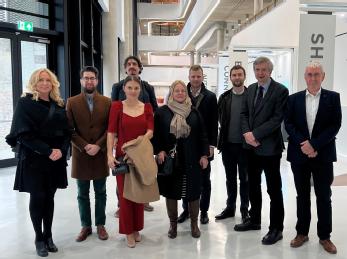Departmental news
The University of Warwick supports RIFT Technology with a greener cost-effective electric motor
A cheaper and more environmentally friendly electric motor for electric vehicles is a step closer to market with the support of WMG at the University of Warwick.
WMG has provided valuable knowledge and expertise in developing a UK focused, cost-effective production and supply chain for RIFT (Reduced  Induction Field Torque) Technology’s development of RIFT-10; a design for electric motor drives that reduces copper and magnet weight reduction by around 50% and lower cost by 75%.
Induction Field Torque) Technology’s development of RIFT-10; a design for electric motor drives that reduces copper and magnet weight reduction by around 50% and lower cost by 75%.
The aim of the project was to help RIFT Technology; an R&D company bringing a product to market for the first time, advance RIFT-10 to a higher manufacturing readiness level (MRL 7), to get the motor closer to production, by rooting the supply chain in the UK, rather than abroad (given the disruption to supply caused by the pandemic) and supporting production of trial units.
WMG, is committed to delivering UK economic impact and achieving net-zero by supporting industry in accelerating new concepts to commercial reality. This supports the University of Warwick’s approach to sustainability - the Way to Sustainable – which focuses on the real-life implications of creating a sustainable future and the practical challenges of getting there - prioritising research expertise, sustainability in the curriculum, and developing solutions for the benefit of industry and society.
The team of experts at the University has facilitated the RIFT-10 project to deliver on creating revenue, jobs, CO2 reduction, and supply chain growth in the UK.
RIFT Technology has developed the RIFT 10-30 kW motor (RIFT-10) by taking an exciting innovation from their sister business (RIFT Actuators) and working with APC and the Niche Vehicle Network to get the motor to working prototype stage (installed on a G-Whiz). The novel electric motor configuration is proven to generate 10-30kW of power, torque from 0-400Nm and up to 10,000RPM as demonstrated with a prototype vehicle.
The RIFT 10 motor demonstrated unique advantages over conventional EV motors:
Environmental benefits of the project:
· The low sales cost and attractive features of RIFT-10 enable greater/earlier market adoption of EUV’s, resulting in a reduction of CO2 production over ICE vehicles.
· A RIFT-10 weight saving and efficiency over competing EV motor designs increase vehicle range, resulting in less energy usage over alternatives.
· With RIFT-10, equivalent power output is achieved using fewer raw materials (i.e., 85% reduced copper weight and ~85% reduced magnet volume), resulting in less earth material usage as well as fewer material costs.
· Less materials usage results in an estimated 75% reduction in CO2 produced during manufacture. Planned production efficiencies also lead to further CO2 reductions. An estimated 612,000 Tonnes of CO2 would be saved by year 5.
· Development of an EV motors supply chain in the UK for a UK and EU market reduces international shipping of components thus reduces related CO2 production.
Social benefits of the project:
· RIFT-10 creates/safe-guards 50+ much needed and good-quality manufacturing, sales, administration and R&D jobs in the Malvern area with an estimated X14 more UK jobs across the supply chain (over 5-years).
· Growth of RIFT-10 addresses the government’s priority area of ‘Smart Cities’ by allowing smart monitoring of vehicle fleets efficiency performance, usage and other data points. The use of the Internet of Things and resulting analysis can only be as strong as the data input. Traditional alternatives offer no smart functionality.
James Black, WMG Innovation Manager at the University of Warwick said, “The Covid-19 pandemic has been particularly difficult for SMEs and R&D-focused organisations that have previously relied on face-to-face networking events to find new partners, investors, and customers.
“WMG’s network means we’re in a great position to connect UK companies together to help them accelerate their product to the market, and we’re delighted that RIFT Technology has benefited from our extensive background for practical supply chain solutions that have delivered economic and societal value to the project.”
James O’Donnell, Technical Manager from RIFT Technology said, “As a research and development company bringing a product to market for the first time, RIFT Technology needed to bridge the gap between prototype and small-scale production. We had to answer difficult questions such as what to make and what to buy, high level questions such as how to develop a supply chain strategy and practical questions such as how best to select suppliers.
“With a unique blend of academic expertise and industrial experience from the University of Warwick, WMG’s Supply Chain and Operations Group were able to support us in our journey.”
The project took place during the pandemic, meaning several online workshops were carried out targeting topics such as strategic management, supplier selection and decision-making, and end-of-life strategies.
For further stories, click here.
ENDS
4 April 2022
Members of the Slovakia government visit WMG
Delegates from the Slovakian government visited WMG, University of Warwick for an introduction into the department’s ground-breaking battery R&D and a discussion on the importance of industry and academia collaboration.
A total of eight delegates led by State Secretary, Ministry of Economy, Ján Oravec enjoyed a tour of the Energy Innovation Centre (EIC) by Chief Engineer, Mark Amor-Segan who demonstrated EIC’s facilities to research, develop and test the latest technologies at the forefront of energy storage.
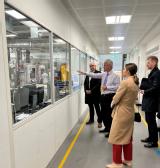
Professor Paul Jennings, Director of Research at WMG, University of Warwick who hosted the visit said: “It was great to be able to meet the delegation and showcase the power of academia and industry working together, demonstrating how we are helping to drive the sector forward through impactful research and new education and skills offerings.”
Find out more about WMG’s energy research here: https://warwick.ac.uk/fac/sci/wmg/research/energy/
Partnership between WMG and The Blair Project to deliver electrification skills training in the north

WMG has partnered with The Blair Project, a social enterprise based in Manchester, to deliver the Emerging Skills Project in the north, a programme funded by the Department for Education (DfE).
The Emerging Skills Project will create a highly skilled workforce that will enable industries including automotive, energy and food and drink, to take advantage of electrification and hydrogen-power to deliver Net Zero.
The course provided by The Blair Project will specifically address technologies related to electric vehicles. This will include the assembly and maintenance of battery modules and packs, recycling and second life, the manufacturing and installation of motors, drives and power electronics and the designing and testing of vehicle and software systems.
Developed in conjunction with businesses who were invited to a series of workshops with DfE, the course will directly respond to the demand for wider adoption and deployment of transport electrification technologies.
The course will be held at the new Manchester Innovation Activities Hub (MIAH) – launching in Spring 2022. Dedicated to the rapid upskilling, reskilling and retraining of more than 5,000 local residents over the next five years, MIAH is set to become a centre of excellence in Greater Manchester and a hub for electrification skills training in the north.
Ben Silverstone, Associate Professor and Head of WMG Skills Centre, said:
“As important as it is to train up the younger workforce in green tech, there is a significant workforce primed for reskilling now. It’s the combination of both that will ensure we are well-equipped to meet the UK’s ambitious Net Zero targets.
“We are pleased to partner with an organisation like The Blair Project to deliver the Emerging Skills Project, meeting the UK-wide demand for electrification skills and giving people in the region the opportunity to upskill or reskill in this area.”
Nile Henry, Founder and CEO of The Blair Project, said:
“The UK is facing a huge skills gap in green tech, particularly electrification, and this is only set to increase as we power towards Net Zero and the demand for a highly skilled workforce grows. Partnering with WMG to become a delivery partner for the Emerging Skills Project is a huge milestone for The Blair Project, and it’s brilliant to see this focus from Government on upskilling adults in green tech.”
Clean Transport Accelerator launched by NatWest and University of Warwick to help SMEs fast-track their innovations
- NatWest and WMG, a department at the University of Warwick, are inviting businesses that are creating the next generation of clean green transport to apply to their new accelerator
- Businesses will receive support to fast-track their innovations, including easy access to clean transport experts and equipment, exclusive 1:1 coaching sessions, and access to growth funding
- The Clean Transport Accelerator is a fully-funded programme and will help the UK be a green leader in carbon-neutral transport for future mobility, helping businesses bring their innovations to the market quicker
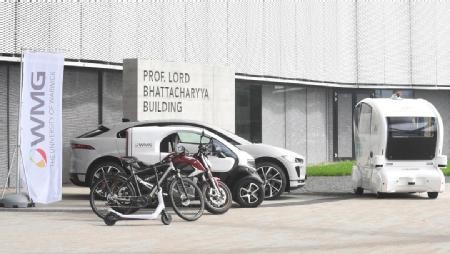 With transport being the largest carbon emitting sector in the UK, a partnership between NatWest and WMG at the University of Warwick has led to the launch of the Clean Transport Accelerator. It will support businesses which are part of the mobility sector to develop products and services that will play their part in achieving the UK’s net-zero goals.
With transport being the largest carbon emitting sector in the UK, a partnership between NatWest and WMG at the University of Warwick has led to the launch of the Clean Transport Accelerator. It will support businesses which are part of the mobility sector to develop products and services that will play their part in achieving the UK’s net-zero goals.
The first cohort of the programme will help 10-15 businesses through education, events, networking and coaching. They will also have access to experts and equipment to help them accelerate their innovations to the market and demonstrate an impact in the pursuit of net zero goals.
Applicants can be from anywhere across the UK and cover a broad range of businesses, whether they are based within supply chains, are fuel providers, want to develop new means of transport, or be focused on specific transport such as light rail, cargo delivery or scooters.
The programme will be delivered jointly by NatWest and WMG, University of Warwick. NatWest will provide an enterprise acceleration manager with 1:1 coaching, access to their accelerator growth events and access to work space, as well as learning hubs at the University of Warwick and Birmingham.
The University of Warwick will provide access to clean energy, manufacturing, automotive and connected experts at WMG and their HVMC (High Value Manufacturing Catapult), as well as the tools to validate and test any equipment designed by the businesses and access to co-working spaces on Campus.
NatWest supported over 55,000 entrepreneurs in 2021 and has 13 accelerator hubs across the UK. Businesses with high growth potential benefit from a range of support through the accelerators. This includes coaching, community, access to a wide network and thought leadership content. NatWest accelerators are keen to attract more female and BAME led businesses as well as companies outside London and the South East. Any business keen to take its next step for growth should consider applying to the NatWest accelerator scheme.
The Clean Transport Accelerator news follows the recent launch of NatWest’s green loans for SMEs and green asset finance through Lombard. Companies can access funds with no arrangement fee to help them transition to more sustainable working practices. The bank has pledged to lend £100 billion by 2025 to businesses looking to invest in being greener. NatWest’s Springboard to Sustainability report, published in October 2021, found that half the UK’s carbon reduction ambition can be delivered by the SME sector and the Clean Transport Accelerator is the bank’s latest offering to help UK SMEs pursue this goal.
Professor David Greenwood, CEO of the High Value Manufacturing Catapult (HVMC) at WMG, University of Warwick comments:
“The drive to net zero has opened up new and exciting opportunities for innovation in the transport sector. Together with NatWest, we’d like to ensure that the UK delivers economic benefits as well as environmental benefits as we meet this critical objective. This programme is aimed to support small and innovative companies as they build and scale up their products, services and business models.”
Richard Hill, Head of Automotive and Manufacturing at NatWest, said:
“NatWest has set out a clear ambition to play a leading role in helping to address the climate challenge, and so we are thrilled to be working with the University of Warwick to offer clean transport businesses a fast-track to delivering on the UK’s green goals.
“Packed with experts, access to equipment, networking opportunities and funding advice, the Clean Transport Accelerator is a must for any business keen to scale up their next step. I look forward to seeing the innovative and exciting businesses that we support.”
Businesses can apply for the Clean Transport Accelerator here: Registration Portal
Where it says ‘Voucher Code’ please enter ‘CleanTransport01/2022’
The deadline for applications is the 11th April 2022.
ENDS
22 FEBRUARY 2022
NOTES TO EDITORS
High-res image available at:
https://warwick.ac.uk/services/communications/medialibrary/images/february_2022/electric_vehicles_outside_wmg_.jpg
Caption: Electric Vehicles outside WMG, University of Warwick
Credit: WMG, University of Warwick
For more information and to apply to the Clean Transport Accelerator visit here
For more information on NatWest’s nationwide accelerators visit here
For more information on NatWest’s green loans visit here
For further information please contact:
Alice Scott
Media Relations Manager – Science
University of Warwick
Tel: +44 (0) 7920 531 221
E-mail: alice.j.scott@warwick.ac.uk
Laura Blumenthal
Media Relations Manager – NatWest
Tel: 07947974464
E-mail: laura.blumenthal@natwest.com
About NatWest Group
NatWest Group is a relationship bank for a digital world. We champion potential; breaking down barriers and building financial confidence so the 19 million people, families and businesses we serve in communities throughout the UK and Ireland can rebuild and thrive. If our customers succeed, so will we.
About WMG, University of Warwick
WMG is a world leading research and education group, transforming organisations and driving innovation through a unique combination of collaborative research and development, and pioneering education programmes.
As an international role model for successful partnerships between academia and the private and public sectors, WMG develops advancements nationally and globally, in applied science, technology and engineering, to deliver real impact to economic growth, society and the environment.
WMG’s education programmes focus on lifelong learning of the brightest talent, from the WMG Academies for Young Engineers, degree apprenticeships, undergraduate and postgraduate, through to professional programmes.
An academic department of the University of Warwick, and a centre for the HVM Catapult, WMG was founded by the late Professor Lord Kumar Bhattacharyya in 1980 to help reinvigorate UK manufacturing and improve competitiveness through innovation and skills development.
Live testing to begin as part of landmark partnership to develop UK electric motorcycle capability
Today (Tuesday 8th February) marks the official end of the collaboration stage of the TE-1 project, a unique four-way partnership with WMG, Triumph Motorcycles, Williams Advanced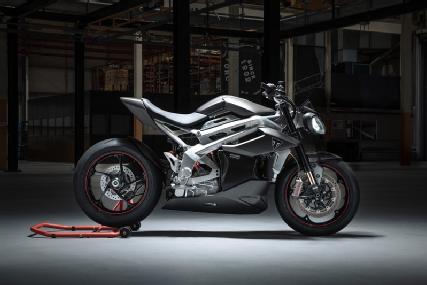 Engineering and Integral Powertrain Ltd e-Drive Division, focusing on developing specialist electric motorcycle technology.
Engineering and Integral Powertrain Ltd e-Drive Division, focusing on developing specialist electric motorcycle technology.
The prototype demonstrator is now fully ready for the live testing programme led by Triumph Motorcycles.
The project, funded by the Office for Zero Emission Vehicles through Innovate UK, was set up to create ground-breaking developments in specialist electric motorcycle engineering and innovative integrated technology design.
Due to WMG’s vast experience and proven track record on key Innovate UK projects, Triumph Motorcycles asked WMG to project manage TE-1 on their behalf.
As part of this WMG was also tasked with identifying the project consortium partners, as well as providing guidance relating to future legislation, charging infrastructure and recycling strategies.
The prototype demonstrator integrates all the latest and final innovations from the project partner workstreams.
Triumph: final chassis, including frame, rear sub-frame, cockpit, panels and wheels, final drive system including transmission and Gates Carbon belt drive, electronics, Öhlins USD cartridge forks, unique prototype Öhlins RSU, Brembo M50 monobloc calipers, and Triumph motorcycle control software
Williams Advanced Engineering: final iteration of prototype WAE battery pack incorporating dedicated cell packaging for optimum centre of gravity, vehicle control unit, DCDC converter, integrated cooling, charge port, and styled carbon covers
Integral Powertrain: final prototype powertrain with scalable integrated inverter and combined motor with silicon carbide switching technology and integrated cooling
WMG: final pre-live trial simulation completed, with all results indicating that the project is on course to deliver the intended performance and durability outcomes
Truong Quang Dinh, WMG’s Associate Professor of Energy Management and Control Systems, explained: “Our creation of initial computer-based simulation models at the start of Phase 1 has been instrumental in ensuring that the component selection was appropriate to achieve the performance targets defined by the partners for the TE-1 Prototype.
“We have continued with this work across Phase 2 of the project, refining the models to a much more complex level to allow us and the partners to imitate further components on the bike such as braking, throttle, lighting and other systems and mimic real-world riding to provide development opportunities and real-time testing before components were fully designed. Additionally, we have created a physical rig wired with all of the control units and e-drivetrain, in order to implement a design validation test programme to ensure the function of each section was within the allowable range.”
Key project achievements so far include test results that exceed current benchmarks and targets set by the UK Automotive Council for 2025, providing a platform with great potential for future development in electric motorcycle performance.
Over the next six months the prototype demonstrator will undertake an extensive live testing programme within Triumph’s state-of-the-art facilities.
At the completion of the live testing phase, estimated to be Summer 2022, the prototype demonstrator will be updated with its final body panels and paint scheme, in preparation for active track demonstration. At this time, the full results of the project including the final specifications and testing outcomes will be published, as well as insights and key facts on how the TE-1 delivers on the project targets for innovation and sets new standards for the motorcycle sector overall, including final battery and range performance.
“It has been truly exciting to see the progress made during phase 3 of Project Triumph TE‑1 with the final prototype motorcycle now going into real life testing. Everyone involved at Triumph are proud to have been part of this innovative British collaboration. Personally, I am thrilled with the results we have already achieved with our partners, and the exciting preview of the potential electric future to come.” said Nick Bloor, Triumph CEO. “We look forward to continuing the ambitious and innovative work on the TE-1 demonstrator prototype through the live testing phase and sharing the outcome with Triumph fans across the world.”
Read more about WMG’s Transport Electrification research expertise here: Energy (warwick.ac.uk)
Partnering with Rolls-Royce and Electroflight to create the battery for world’s fastest all-electric aircraft
- The Rolls-Royce ‘Spirit of Innovation’ aircraft is officially the world’s fastest all-electric aircraft, clocking up speeds of 387.4mph
- Rolls-Royce worked in partnership with aviation energy storage specialist Electroflight to create this world-class technical achievement for the UK, that will help lead the way towards a more sustainable way to fly
- In order to power the aircraft, the most power dense propulsion battery pack ever assembled in aerospace had to be developed directly supported by researchers from WMG, University of Warwick using their state-of-the-art battery characterisation and testing facilities
In the wake of COP26 the need for electrification has never been more evident, with aviation top of the list of global priorities.
Committed to taking on this challenge, Rolls-Royce decided to create the ‘Spirit of Innovation’, an all-electric aircraft, which this week officially set not one,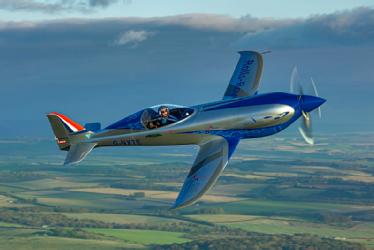 but two World Records and during these record runs it reached speeds of 387.4mph (623 km/h) making it the world’s fastest all-electric vehicle.
but two World Records and during these record runs it reached speeds of 387.4mph (623 km/h) making it the world’s fastest all-electric vehicle.
In embarking on this unprecedented feat, Rolls-Royce partnered with aviation energy storage specialist Electroflight to help develop the battery system for the record-breaking plane. The WMG team at the University of Warwick were exclusively used to test and validate the batteries used on the aircraft.
Using their state-of-the-art facilities at WMG’s Energy Innovation Centre, researchers at WMG supported the team through the development process, conducting extensive electrical, thermal, safety, and vibration & shock testing. This was delivered all the way from Electroflight’s initial single lithium-ion cell selection through to the battery module and finally the battery pack for a full propulsion battery system.
Testing included cell selection, fire protection system design, module level thermal management, system testing and pack level testing, and also included sub-powertrain testing of the battery system and electric machines connected together.
Individual components such as the battery casing materials, individual lithium-ion cells, cell clusters and sub-modules were all examined in WMG’s battery testing laboratories including the Battery Abuse Testing Centre. Aerospace DO-160G shock and vibration testing was performed in WMG’s battery vibration facility – the first time an aircraft propulsion battery has successfully completed DO-160G testing in the UK.
On 16th November, the Spirit of Innovation took to the sky at the UK Ministry of Defence’s Boscombe Down experimental aircraft testing site for its record-breaking flight. Data was submitted to the Fédération Aéronautique Internationale (FAI), who control and certify world aeronautical records, have confirmed that the Spirit of Innovation is the world’s fastest electric plane.
The two new world records broken are:
1. The aircraft reached a top speed of 555.9 km/h (345.4 mph) over 3 kilometres, smashing the existing record by 213.04 km/h (132mph)
2. The aircraft achieved 532.1km/h (330 mph) over 15 kilometres – 292.8km/h (182mph) faster than the previous record
Chief Engineer Mark Amor-Segan, from WMG, University of Warwick comments:
“It’s incredibly exciting to see Rolls-Royce’s ‘Spirit of Innovation’ be awarded two new world records and officially be titled the World’s fastest all-electric aircraft. It has been a tremendous journey to share with Electroflight, to help verify and validate the battery system end-to-end and help create the most power-dense propulsion battery ever for Aerospace.
“We have worked closely with Electroflight and Rolls-Royce throughout this process, cementing new collaborative relationships and helping achieve world-class pioneering technology. To see it progress from literally a single cell into a full-scale battery system and a world-record breaking flight, is tribute to the incredible dedication and capability of the whole team at ACCEL. This project has played a very important part in our work in Aerospace, and we’re excited to continue our research into electrification and the future of sustainable flight.”
Douglas Campbell, Technical Director of Electroflight said:
“This has been a landmark project for our company and our industry – one which opens up a world of possibilities in the electrification of aviation. We’re thrilled to have played such an important part in this success and grateful to our partners at WMG for their support throughout this endeavour.”
Customer Director Matheu Parr from Rolls-Royce added: “The support we received from WMG to develop the battery technology that would power the world’s fastest all-electric aircraft was critical for the team’s record-breaking triumphs. Rolls-Royce has a long-standing relationship with WMG to ensure we are the forefront of technology and we will build on this capability to deliver propulsion and power systems for the advanced air mobility market.”
ENDS
26 JANUARY 2022
NOTES TO EDITORS
High-res images available at:
Pictures and B-Roll video footage can be found here:
https://www.flickr.com/photos/rolls-royceplc/albums/72157705298410174
https://vimeo.com/rollsroyceplc
Credit: Rolls-Royce
FOR FURTHER INFORMATION PLEASE CONTACT:
Alice Scott
Media Relations Manager – Science
University of Warwick
Tel: +44 (0) 7920 531 221
E-mail: alice.j.scott@warwick.ac.uk
Challenges of transport electrification skills to be addressed by Universities of Warwick and Newcastle
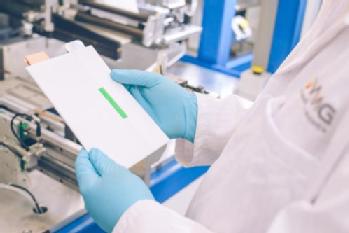 Two leading universities in the field of electrification – WMG at the University of Warwick and Newcastle University – are coming together to ensure the UK workforce has the skills necessary to meet the challenges of the transition to fully electric production.
Two leading universities in the field of electrification – WMG at the University of Warwick and Newcastle University – are coming together to ensure the UK workforce has the skills necessary to meet the challenges of the transition to fully electric production.
As anchor higher education institutions with exceptional research and innovation programmes operating in regions at the forefront of the UK’s electric revolution, the universities intend the collaboration will enable the growth of a talent pipeline of graduates and postgraduates into UK business. Led by WMG at the University of Warwick and Zero Carbon Futures at Newcastle University part of the school of engineering, the effort will identify the people, skills and facilities needed across a range of academic disciplines and levels in order to deliver new curriculums to meet growing industry demand.
The UK’s move to fully electric vehicle production and domestic battery manufacturing represents the largest shift in industrial skills for the UK in a generation, leaving competency gaps at all job levels, particularly in engineering and manufacturing roles which will need to be filled with specific education and training. The Faraday Institution estimates that to meet automotive production demand by 2040, an additional 70,000 skilled employees will be needed for battery manufacture and in the associated material supply chain.
“In light of COP26, which stressed the need for electrification to help us combat climate change and reach Net Zero goals, it is imperative that researchers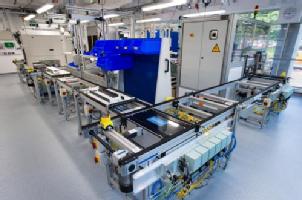 and industry work together to bridge the gaps and create a smooth transition to electrification,” commented Dr Benjamin Silverstone from WMG, University of Warwick. “We are delighted to be working with Newcastle University and believe that together we can define what and who needs upskilling, reskilling and new-skilling.”
and industry work together to bridge the gaps and create a smooth transition to electrification,” commented Dr Benjamin Silverstone from WMG, University of Warwick. “We are delighted to be working with Newcastle University and believe that together we can define what and who needs upskilling, reskilling and new-skilling.”
Professor Colin Herron CBE, Zero Carbon Futures at Newcastle University and Faraday Institution North East regional liaison said, “The bringing together of the two leading universities in electrification, located in the two regions leading on transport electrification is an exciting prospect, and one which should deliver the skills required for massive challenges ahead.”
“We fully support this collaboration between two powerhouse institutions working at the forefront of electrification,” said Professor Pam Thomas, CEO, The Faraday Institution. “Such innovative partnerships will enable the UK to anticipate and deliver the skills needed to fully electrify transport, grow new talent for battery production, and support green growth and economic development."
Another key objective of the collaboration is to help shape national and regional skills strategies and in so doing support national and regional economic development. The call for a collaborative approach to re-skilling, up-skilling and new-skilling the workforce for the electric revolution was published in a report by WMG, University of Warwick, the Faraday Institution and the High Value Manufacturing Catapult ‘The Opportunity for a National Electrification Skills Framework and Forum’ in September 2021.
ENDS
14 DECEMBER 2021
NOTES TO EDITORS
High-res images available at:
https://warwick.ac.uk/services/communications/medialibrary/images/july_2020/wmg_ukbic-33.jpg
Caption: A battery pouch made at WMG, University of Warwick
Credit: WMG, University of Warwick
https://warwick.ac.uk/services/communications/medialibrary/images/july_2020/d2807-27.jpg
Caption: A battery production line at WMG, University of Warwick
Credit: WMG, University of Warwick
https://warwick.ac.uk/services/communications/medialibrary/images/july_2020/wmg_ukbic-49.jpg
Caption: A battery production line at WMG, University of Warwick
Credit: WMG, University of Warwick
FOR FURTHER INFORMATION PLEASE CONTACT:
Alice Scott
Media Relations Manager – Science
University of Warwick
Tel: +44 (0) 7920 531 221
E-mail: alice.j.scott@warwick.ac.uk
Margot James, Executive Chair, comments on the Government’s new Net Zero Strategy
Expert comment from Margot James, Executive Chair at WMG, in response to the Government’s Net Zero Strategy.
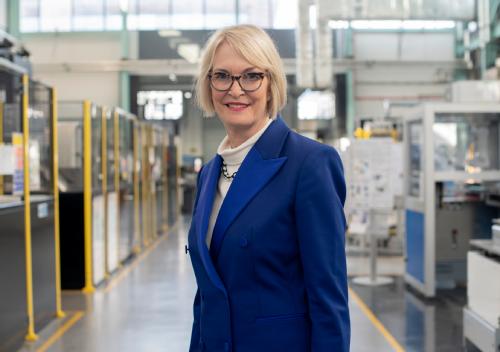
"The decarbonisation of personal transport, by moving to Electric Vehicles (EVs), will be a major contributor to delivering on this target as EVs become a viable option for the majority of consumers. Viability depends upon EVs being affordable and drivers having access to a reliable network of fast charging in urban and rural networks"
UK Government Net Zero Strategy
Find out more about the new National Skills Framework that has been created by WMG, The Faraday Institution and the High Value Manufacturing Catapult: New National Electrification Skills Framework and Forum could put the UK at the forefront of the green revolution News
Dr Ben Silverstone comments on the Government’s new Net Zero Strategy
Expert comment from Dr Ben Silverstone, WMG’s National Electrification Skills Framework and Forum Programme Lead, in response to the Government’s Net Zero Strategy.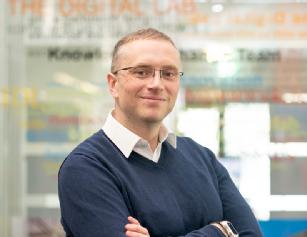
“We welcome the Government’s Net Zero strategy and the commitment to reform the skills system to allow providers to be more responsive to industry need, which is what we have called for in the recently launched National Electrification Skills Framework. Our focus is to re-skill, up-skill and new-skill working with the automotive sector to ensure their workforce has the necessary skills to be able to meet the 2035 and 2050 targets set by government.”
Find out more about the new skills framework that has been created by WMG, The Faraday Institution and the High Value Manufacturing Catapult here: New National Electrification Skills Framework and Forum could put the UK at the forefront of the green revolution - WMG :: News (warwick.ac.uk)
WMG experts to present at key EV battery conference
 WMG’s Professor James Marco, Dr Ben Silverstone and Dr Anwar Sattar will be sharing their expertise at the IMechE’s International EV Batteries 2021: Cost-Effective Engineering for Hybrid and Electric Vehicles next month.
WMG’s Professor James Marco, Dr Ben Silverstone and Dr Anwar Sattar will be sharing their expertise at the IMechE’s International EV Batteries 2021: Cost-Effective Engineering for Hybrid and Electric Vehicles next month.
The two-day event which takes place on 9-10 November at Kia Oval, London, explores the latest developments in battery design, testing, thermal management, charging and integration right across the lifecycle of the battery with the aim of creating more resilient and cost-effective systems.
On day one, Professor James Marco, WMG’s energy storage expert will present ‘Smart battery development for improved EV safety characterisation,’ and Ben Silverstone, WMG’s UK Electrification Skills Framework Programme Lead, will explain more about the 'National Battery Skills Framework: Collaborating to Elevate UK Industry.’
characterisation,’ and Ben Silverstone, WMG’s UK Electrification Skills Framework Programme Lead, will explain more about the 'National Battery Skills Framework: Collaborating to Elevate UK Industry.’
On the final day, Lead Engineer in Battery Recycling, Anwar Sattar will be presenting ‘Establishing a lithium-ion battery recycling industry in the UK,’ discussing types of waste material found along the supply chain, recycling processes required to deal with material streams, and explaining more about the RECOVAS research project.
Find out more about the conference and book your place here: International EV Batteries 2021: Cost-Effective Engineering for Hybrid and Electric Vehicles | London | CMP7333 (imeche.org)

